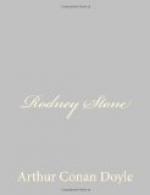As he spoke his face was very grave, but the light in his eyes danced and gleamed. He handed his open snuff-box to my father, as Ambrose followed my mother out of the room.
“You number yourself in an illustrious company by upping your finger and thumb into it,” said he.
“Indeed, sir!” said my father, shortly.
“You are free of my box, as being a relative by marriage. You are free also, nephew, and I pray you to take a pinch. It is the most intimate sign of my goodwill. Outside ourselves there are four, I think, who have had access to it—the Prince, of course; Mr Pitt; Monsieur Otto, the French Ambassador; and Lord Hawkesbury. I have sometimes thought that I was premature with Lord Hawkesbury.”
“I am vastly honoured, sir,” said my father, looking suspiciously at his guest from under his shaggy eyebrows, for with that grave face and those twinkling eyes it was hard to know how to take him.
“A woman, sir, has her love to bestow,” said my uncle. “A man has his snuff-box. Neither is to be lightly offered. It is a lapse of taste; nay, more, it is a breach of morals. Only the other day, as I was seated in Watier’s, my box of prime macouba open upon the table beside me, an Irish bishop thrust in his intrusive fingers. ‘Waiter,’ I cried, ‘my box has been soiled! Remove it!’ The man meant no insult, you understand, but that class of people must be kept in their proper sphere.’
“A bishop!” cried my father. “You draw your line very high, sir.”
“Yes, sir,” said my uncle; “I wish no better epitaph upon my tombstone.”
My mother had in the meanwhile descended, and we all drew up to the table.
“You will excuse my apparent grossness, Mary, in venturing to bring my own larder with me. Abernethy has me under his orders, and I must eschew your rich country dainties. A little white wine and a cold bird—it is as much as the niggardly Scotchman will allow me.”
“We should have you on blockading service when the levanters are blowing,” said my father. “Salt junk and weevilly biscuits, with a rib of a tough Barbary ox when the tenders come in. You would have your spare diet there, sir.”
Straightway my uncle began to question him about the sea service, and for the whole meal my father was telling him of the Nile and of the Toulon blockade, and the siege of Genoa, and all that he had seen and done. But whenever he faltered for a word, my uncle always had it ready for him, and it was hard to say which knew most about the business.
“No, I read little or nothing,” said he, when my father marvelled where he got his knowledge. “The fact is that I can hardly pick up a print without seeing some allusion to myself: ’Sir C. T. does this,’ or ‘Sir C. T. says the other,’ so I take them no longer. But if a man is in my position all knowledge comes to him. The Duke of York tells me of the Army in the morning, and Lord Spencer chats with me of the Navy in the afternoon, and Dundas whispers me what is going forward in the Cabinet, so that I have little need of the Times or the Morning Chronicle.”




